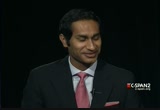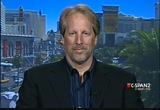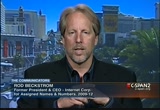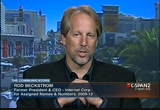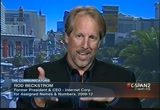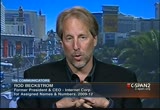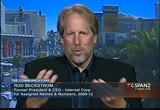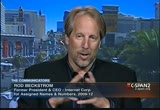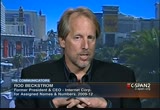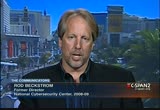tv The Communicators CSPAN July 30, 2012 8:00am-8:30am EDT
8:00 am
8:01 am
nagesh, editor of the technology executive briefing for cq. mr. nagesh, if you would start the questioning. >> host: absolutely. hello, rod. our first question today is who owns the internet right now? or the physical star of the inter-- star of the internet? >> guest: governments own a very small amount, but we estimate over 85% is actually owned by private individuals and firms. >> host: and a look at the federal infrastructure involved. >> host: and are they concentrated in any particular country, or is it fairly spread apart? >> guest: you know, we estimate there's approximately 2.2 billion users on the internet today. about half of that investment overall is in asia, and half is spread around the world. the united states has got a pretty good portion, europe, but you've also got good penetration growing in latin america and africa. >> host: so, rod beckstrom, who
8:02 am
manages it? >> guest: well, you know, the internet is a magnificently decentralized creation, and so it's governed by a multistakeholder community with a lot of different organizations around the world with more than 242 different countries and territories involved. and one of the key coordination bodies is ican, and ican and its community are the stewards for what we call the domain names, the network addresses and then what are some protocol and parameter registries. so they're governed through a very multistakeholder process with companies involved, government involved, individuals involved and even civil society organizations. >> host: can you explain to our viewers what exactly it is that i can if, n -- icann does? >> guest: it's millions of private networks, but it looks
8:03 am
like one place. why? because domain names are unique and consistent all over the world. because every network address is unique. so your e-mail address is withdrew anemic, and no one else has that same address. that integrity of uniqueness is essential so that the internet looks like one place. icann is a coordination body that was created to maintain uniqueness of those things that makes the internet look like one place. >> host: so, rod beckstrom, you were president of icann for a little over three years. what were your goals going in, and do you think you achieved them? >> guest: my number one goal was to make icann a more global organization. and thirdly was to execute the key strategic programs. and i think that we succeeded very significantly on all three
8:04 am
fronts despite some pretty serious headwinds and a complex environment to get things done in. >> host: recently, icann added new potential domain names or took deposits on new potential domain names. how did that process go? >> guest: sure. that process -- when icann was created, one of the reasons in the original mission statement was to create more consumer choice and competition. because when we were formed, there was one dominant domain name registry and registrar. consumers didn't have a choice, and they had to pay about $35 a year to get a dot.com name, for example. so icafn was created to foster choice. this is the third time in history we've done it, but by far the largest opening. the process started about six or seven years ago in 2005 the policy development process started. the policies were approved in 2008, and from 2008 to 2011 we
8:05 am
were developing the details of the program. and then in the first half of this year we opened it up for applications and closed it and i think, as you know, received 1900, over 1900 applications. >> host: so $185,000 per application, correct? >> guest: that's right. that's exactly right. >> host: what is that money used for, and who gets to hold on to it? >> guest: icann's a nonprofit organization, and this program was costed out on break-even basis. so the $185,000 is an estimate of what it will cost to process those applications. there's legal checks, criminal background checks on officers, financial checks, technical checks, there's review panels, there's objections that can be filed that have to be reviewed by arbitration panels, so it's a very complex program. those are the estimated costs. if the costs come in lower than that, then the icann community
8:06 am
will decide what should be done with those funds. they do not go to icann for covering operations unless the commitment decided to do that. so that's the estimated costing for the program. >> host: rod, you mentioned you looked to internationalize icann. there have been growing calls for greater international involvement in the internet. what is your response to some of these calls for having, say, the united nations have a greater role in how the internet is managed and regulated which are opposed by lawmakers here in the u.s.? is. >> guest: i think the internet coordination should continue to become more and more global, and we made significant strides over the last three years. we added more members to our governmental advisory committee, so we have 110 governments of the world formally advising icann. we added more than 30 new members to the domain name operators in different countries
8:07 am
around the world. we built an international management team. when i came in, there was one non-english language fluency and executive management team. when i left, there were 17, and we had members from china, mexico, united kingdom, france, lebanon and other parts of of the world. so we made a lot of progress. and we also opened up the internet itself to internationalization by including internationalized domain names so if you live in china, you can type in domain names entirely in chinese characters if you register under the chinese characters. we did the same thing with parties in india and around the world. so the root that used to be all latin-based characters is now including international scripts. this is very important. with respect to the united nations and the itu, there is an interest, of course, by many governments in the world are struggling with how do you deal
8:08 am
with the internet, with this incredible tsunami force of change that is shifting society, affecting governmental structures, etc. and when you have that level of change, of course, you've got different government bodies that might be seeking to change or extend their set of authorities to expand into an area such as the internet, and i think that's what we see taking place here. >> host: now, how serious a threat for you is the notion of governments interfering with the domain name system or the internet for censorship reasons or in some cases for protection of intellectual property? we've seen a host of reasons why governments have sought to tap into the internet's physical and network structure. is that something that icann is concerned about, are you personally now that you're no longer with the organization, is that something that you feel is a threat? >> guest: yes, it's something i'm very concerned about. certainly something that icann and the internet community are very concerned about not only at
8:09 am
the international level of international governmental bodies seeking to expand their authority or mandate, but also national goths. and we saw that here, for example, in the united states of america with the sopa debacle when there's a proposal to stop the online privacy act and included provisions that would have dns filters or blocking web sites without proper due process. and the great news is the netizens in this country and political activists rose up with the leadership that jimmy wales and others demonstrated by taking wikipedia offline for a day -- and i think there was more than 10 million letters and e-mails in a single day -- froze sopa in its tracks. and this is part of the new reality governments have to deal with. when they try to create new regulations that might harm the integrity and the openness of the internet, there's a very, very strong the public response. and i think we would see the
8:10 am
same thing at the international level that we've seen at the national level, and that's a good thing, i would argue, because it keeps a check and balance going. because it's easy to talk about regulating the internet, but it's a very difficult and dangerous thing to do because very often the proposed prescription to fix a problem is much worse than the underlying disease or problem that some party feels they're trying to address. so we've got to keep the internet open, we've got to keep it unified. we need to keep it global, keep it as neutral as possible, and it should be governed by these open, multistakeholder processes that include the technical experts that can make sure the integrity of the system is managed. because the end result that we all want to have is that we should each be able to communicate with anyone anywhere anytime in the world. and for that to happen there has to be this global openness and the integrity in the system. i think that's what a lot of us care about and continue fighting for. >> host: rod beckstrom has the new app world that we live in
8:11 am
now changed icann's mission? >> guest: oh, i don't -- interesting question. i'm here at black hat. there's a lot of discussion of apps and all the security vulnerabilities that come through this profusion of hundreds of thousands of new apps being built. you know, technology's exciting because it's always a changing game. um, some parties have said, for example, that perhaps creating all these new apps are going to make doe neighbor maim -- domain names less valuable or use. but there's no indication of that so far. you see a tremendous profusion of creativity and new applications on smartphones and tablets, and at the same time we're seeing more creativity and growth in the domain name industry. so far i don't want see a big change, and yet at the same time no one can predict the future in technology. things just move so quickly. so we're all students of this magnificent process that continues to unfold. >> host: well, you've mentioned black hat. what is that, and in your
8:12 am
previous life you were the director of the national cybersecurity center, and is that why you're at black hat? >> guest: well, i do have an affinity for the security community and the field, and i did start coming here, in fact, when i was in that position. i had the great honor of keynoting here in 2008. and, in fact, as i'm sitting here today, sean henry -- former director of cybersecurity at the fbi -- is giving his keynote this morning. but black hat is a preeminent security conference globally. there is about 7,500 people registered here this week. and then it's interesting because after three, four days of meetings with the security community, we have people from companies here, security companies, security experts, hackers here, the whole kind of ecosystem. then on friday and saturday there's another conference called deaf con which is a hackers' conference, and i think that they're expecting somewhere between 5-8,000 hackers as well as some of the other security
8:13 am
participants to be there, and i'll be attending def con as well. so it's a very exciting time to hear what's going on in security, see the new threats, vulnerabilities in products and also see what people are doing to counteract those. >> host: rod beckstrom, you mentioned def con, the hackers' conference. they've confirmed that the head of the nsa, keith alexander, will be speaking, doing their keynote. you resigned your position because of the nsa, is that correct? >> guest: no, that's not correct. i expressed certain views when i resigned about the nsa, but i did not resign off the n -- because of the nsa. i resigned because i felt i was ready to move back to california to be with my family. >> host: well, you said you thought it was bad policy for security and privacy issues to be centered under a military agency such as the ns sax.
8:14 am
nsa. >> guest: yes, i did say that, and i still believe that there needs to be a separation between civilian activities in cyberspace and those security activities and military acttivities. it's an important principle in american constitutional history. >> host: now, rod beckstrom, currently cybersecurity is working its way through the congress. do you have views on the current attitude towards cybersecurity in the congress? >> guest: well, i think congress is concerned, and i think a lot of people are concerned. the reality is anything attach today a network these days is vulnerable. you know, that's just the reality of this new hypertransparent world that we live in, and i think we're all struggling with how to best develop new policy structures and approaches for dealing with that. it's a challenge to do. it's much easier to write policy than implement successful programs and no one's got all the answers. so i think it's good that congress is focusing on it.
8:15 am
i think it's also very important that they work closely with the global internet technical community wells civil rights, civil liberties groups and make sure the right balance is achieved in any legislation that's created. and in general, you know, not a fan of a lot of regulation here. i mean, the internet is a force of its own. we have existing legal structures for many of the rights we have in society, and we have to be careful not to create new legislation and new laws that are very difficult to implement or that impinge upon this openness of the internet that we all enjoy. >> host: you are watching c-span's "communicators" program. our guest is rod beckstrom who for three years served t as president of icann. prior to that, director of the national cybersecurity center. he is a technical -- i don't know, i guess the word is whiz from silicon valley originally,
8:16 am
graduate of stanford university. our guest reporter is gautham that fresh of -- nagesh of "congressional quarterly." >> host: rod, you discussed the legislation that's currently in front of congress. specifically in the senate, we're seeing them debate a piece of legislation where the sponsors have bent over backward to try to appease some of the concerns from privacy advocates, but they've also been forced to make concessions of regulation. so what would you like to see from a cybersecurity law passed by congress, if at all this year? >> guest: you know, i have not jumped in depth, so i'm not a position to go into it in specific detail. i'm pleased to hear concessions have been made to try to strike a balance. i haven't necessarily heard that feedback from all the communities that they're content with where we've gotten to yet.
8:17 am
i think there's more work to be done, and i think we've got to be very careful and deliberate in what we do. >> host: how much can legislation or policy really make a difference? as you discussed, a lot of this is about implementation. what sort of differences could policy make? are there positive steps that could impact the operational state of cybersecurity right now? >> guest: sure. i mean, good policies can always help. and then the challenge is how do you craft a good policy. you know, one of the things that i believe in strongly, and this is also reflect inside the book i co-authored called "the starfish and the spider," is that, you know, when you're dealing with the world of hacking and hackers, then you want to deal with it in a decentralized way usually if you want to to be successful. i think the u.s. government will be more successful in fostering collaboration centers that include government, private sector, law enforcement and others that's voluntary, state,
8:18 am
local as well as federal. foster the collaboration. don't try to control it. don't try to pull the information into the government because that usually becomes a one-way, you know, sucking sound, and there's not much information going the other way, and a lot of trust gets lost there. so i think we should focus on education programs in schools, make sure we're investing in cyber education, make sure we're investing to support collaboration and make sure that we're supporting the, you know, research and development and the development of best practices. i think that's a better solution than trying to look at any sort of top-down approaches. >> host: rod beckstrom, back to the top-level domain name issue. 900 or -- 1900 or so applications. is cyber squatting a he g8 mate -- legitimate business in this case? >> guest: you know, it's actually a very tricky thing to define, okay? it's an easy word to say, but there's different definitions of how people look at this. this program was created so that
8:19 am
parties that own a trademark or service mark have preference over those that don't. so there's a whole set of different protections put boo this program to -- into this program to december courage cyber squatting. will there be some defensive registrations, and can that's the term of when some parties might choose to go register their name in a new top-level domain, and they're doing it to protect their name or brand. certainly, there would be some level of that. however, most parties when they do those so-called defensive registrations actually link it back to their main web site and use it to drive more business to themselves, and anyone who's doing that is deriving economic benefit out of having those registrations. so it's not a simple issue and, again, a lot of the smartest intellectual property experts in the world worked on this program for six years and add add --
8:20 am
added a lot of stuff into the program. >> host: are you -- are you satisfied -- >> guest: i'm sorry. >> host: no, i apologize for interrupting, but are you satisfied with ip protections around the world right now? >> guest: oh, gee. you know, that's a big question. you know, am i satisfied? i think that there's a number of challenges. so let's take the trademark system as an example. and, you know, the trademark system is designed by country typically, by nation-states, and then it has different categories. typically, there's more than 40 categories in more than 100 countries that have these systems. so there's 4,000 different parties that can have the right to exactly the same trademark, okay? so it's fractured by geography and industry category. the domain name system is unique. there's only one, you know, brand name.com, for example. and so what it means is there's
8:21 am
a fundamental mismatch there. so this fractured system is trying to map to a system that has integrity and is internationally unique. so you're always going to be tension there. um, so that's an imperfect flaw that just comes from history of how the trademark system was established by nation-states. and the internet's this new global system, so you've got an incompatibility there. i think intellectual property rights is different around the world because of actions that parties can take, and i think a we've seen in the icann community is a lot of work to improve those programs, and there is an intellectual property constituency, for example, in icann that has prominent attorneys. but am i personally happy with the overall global system? for one thing, i note that fundamental die notny in -- dichotomy in the infrastructure, and i know the difficulty of
8:22 am
enforcement because of how open and unified the internet is. so i think we've got some interesting policy challenges. >> host: and what about privacy protection? >> guest: privacy protection? the internet brings radical transparency to almost everything it touches. privacy becomes a construct. it's an artificial construct, very important one, created by laws and institutions and enforcement. and so i think privacy is important because we all value it in our lives, and i think it's challenged by the internet, and i think it's why it's really important that there's outspoken, articulate groups out there that -- and citizens, people around the world sporting the importance of some role of privacy in the internet. and at the same time people want openness. so those are the tensions, you know, between the openness of the internet, between the
8:23 am
desires for privacy and the desires for belek chul property -- intellectual property protection. there's not a simple solution that can solve that equation. and so we're going to find ourselves it rating around different solutions over time, i think, to get our hands around these issues. >> host: next question from gautham nagesh. >> host: obviously, the high price tag we saw mostly with the high price tag we saw mostly companies applying for the domain name suffixes. but my question is, are domain names and, therefore, domain name suffixes, are they losing a little bit of importance to consumers? because right now these days when you go on tv, people ask you for your twitter handle as opposed to your dot.com or what have you, and i find that social media's primarily the identifier for many people these days. so how do you think ha that's affected the domain system and icann specifically? >> guest: sure. when facebook started getting
8:24 am
really popular about five years ago, some people predicted registration domain names would start to shrink. it just hasn't happened. now i think it's back up to about where it was, and by international i mean just globally. i think the industry's growing at approximately 5-7% per annum in registrations and revenues. so there's continuously growth in the business. you know, i think it may change sometime, it may turn around, it may contract, but, you know, i think what's interesting is just how the internet continues to expand and touch our lives in so many different ways. and it's really up to consumers in the market to decide. do they want to use a twitter handle or their e-mail address or some other tool as primary contact names? or telephone numbers, you know? these things will all change and coexist. i'm not really sure where it'll go.
8:25 am
it'll be interesting. >> host: what's the approval process on these 1900 applications? >> guest: well, they go through an initial evaluation phase, each of the applications, to see if all the information's complete, and they're valid applications, etc. so they're all being worked through that process right now. and then the community and the organization will be developing some approach to order the processing of those or to process them as a whole group, and then there's an objection period that's very important that's open right now and a comment period. so anyone listening to this program, if you hear about a new gtld name that you either like or don't like, you can go online to icann.org and file your comment right now either in support or objecting to any term. and there's also a formal objection process where parties with standing have an ability to actually file a specific objection. so, for example, if you own a trademark and you feel that someone has filed for a new
8:26 am
top-level domain that has our trademark in it and they have no trademark rights, you can file a specific objection, and that will go to a review panel. and if you own the trademark and the applying party doesn't, you're in a really good position to block that application. so the applications get processed, they have to get through the objections. if they get through the objections, if they get past the criminal background checks, the financial checks, the technical checks, etc., etc., then eventually they will be put forward to the board of icann for approval. and then after they're approved, they can subsequently be entered into the root of the internet. so it's a process that takes time. the very earliest, you know, you might be seeing something new is about a year from now. and it may take some number of years to process this large number of applications. be. >> host: and do you expect the most of those companies that are approved would then sell or offer as a service those, the option to create new sites using that domain suffix?
8:27 am
is that, essentially, what most proposals say? is. >> guest: we'll see. youyouyou know, a range in the proposals. some of the organizations will probably just use it, let's say i'm a big company, i'm going to have dot company name because i want to be branded with my company name, i don't want to be advertising somebody else's dot tld. so i might use it as my primary registration site. or maybe i'm a broad-based internet provider, and i want to provide free free mail addresses to people. then some parties may be providing, you know, millions of e-mail addresses for free or domain names for free. so there's a whole set of different, you know, options that the parties have. it'll be interesting to see what the -- what creativity comes out of it. and then you have some developers, more investors that want to develop a new category and create community and/or a business model around whether it's, you know, a city and getting registrants from a city
8:28 am
or around a sport or any other kind of activity. is so there's quite a broad view, and they're all online. people can go online and take a look at all the applications and the information that was submitted on how it's proposed they'll be used. >> host: and finally, rod beckstrom, who succeeded you at icann and what do you think the biggest challenges facing that organization are in the short term? >> guest: sure. my need successor is the chief operating officer i recruited who's an excellent executive and just a superb, superb operating leader, and i'm really pleased to see him stepping into the role. he's lebanese, and i think that's really excellent in the sense that i was the fourth icann ceo, and i was the fourth one born in an english-speaking country, and i think it's great that we've got someone who's promoted from the inside and comes from the non-niche-speaking -- non-english-speaking role.
8:29 am
and then ago -- agram had work with the previously who has a strong background in technology and has also worked on open resource issues. the challenges are very much, i think, the same ones we've dealt with; continued nationalization and globalization of the organization, dealing with the geopolitical threats and challenges and national regulation challenges from around the world that might seek to impinge upon the domain name system and the integrity of the internet, and then the execution of this very large and very complex top-level domain program. >> host: rod beckstrom, former president and ceo of ica, this n and former director of the national cybersecurity center. thank you for being on "the communicators" from vegas. also joining us was gautham nagesh, editor of "congressional quarterly"'s technology executive briefing. gentlemen, thank you. >> guest: thanks for having me. >> coming up next, political
148 Views
IN COLLECTIONS
CSPAN2 Television Archive
Television Archive  Television Archive News Search Service
Television Archive News Search Service 
Uploaded by TV Archive on

 Live Music Archive
Live Music Archive Librivox Free Audio
Librivox Free Audio Metropolitan Museum
Metropolitan Museum Cleveland Museum of Art
Cleveland Museum of Art Internet Arcade
Internet Arcade Console Living Room
Console Living Room Open Library
Open Library American Libraries
American Libraries TV News
TV News Understanding 9/11
Understanding 9/11
